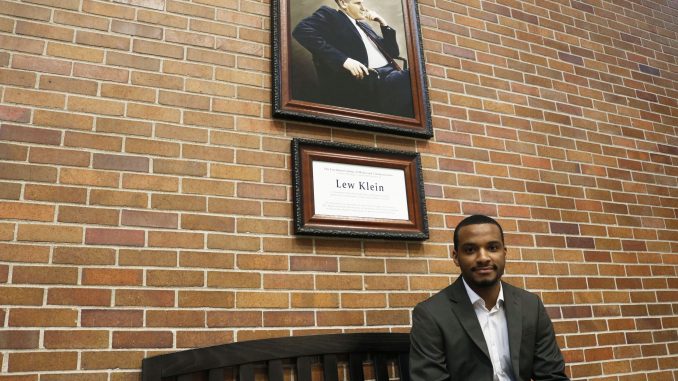
When Hazim Hardeman rode his bike with his friends as a kid, crossing the boundary of Main Campus felt like a “transgression.”
The scholar grew up at 23rd and Diamond streets and said Temple always felt like home to him, even though he never knew anyone who went to the university when he was a child.
“We knew that people where we were from didn’t go to this school, so being there, we wanted to be seen,” Hardeman said. “This was our neighborhood.”
Now, more than a decade later, he walks on Main Campus as an adjunct instructor and a Rhodes Scholar, a prestigious postgraduate scholarship for students to study at the University of Oxford in England for two to three years with 80 other people from all over the world.
Hardeman, a 2017 strategic communication alumnus and a communication and social influence adjunct instructor, is the university’s first Rhodes Scholar.
Hardeman plans to study sociology and political theory at the university.
“Just being in the heart of North Philly…it just felt like it was the place I needed to be,” he said.
Hardeman briefly attended school in North Philadelphia as a child. His mother, Gwendolyn, falsified their ZIP code to send him and his older brother to Shawmont School in Roxborough from third to eighth grade, where she hoped he would have more access to resources.
School officials eventually found out, but since they were good students, officials decided to bus them 20 minutes to the school every day.
“There was a culture of investment in the students,” Hardeman said. “Even when I wasn’t on my game as a student, there was still a general ethos of the school that has been formative in instilling me that I can be a successful student, that I am smart, and my experiences are valuable.”
“It has always stuck with me whenever I’ve had self doubt,” he added.
Hardeman is the first in his family to go to college. He credits his mother, who thought education was central to his future success, for pushing him every step of the way. When she moved to Atlanta without him while he was in high school, his grades plummeted.
“With her being removed from the situation, it was easy for me to lose sight of what was important,” he said.
But once she came back, he was able to excel again as a high school student. He graduated high school in 2012 and enrolled in the Community College of Philadelphia.
Hardeman excelled at CCP, graduating in 2015 from its honors program. The communications classes he took were his first exposure to the subject that would later become the main focus of his studies.
He then transferred to Temple to study strategic communication with a focus on rhetoric and public advocacy.
“To explicitly be engaged in work that not only you’re passionate about, but work that you see as having transformation in the world was important to me,” Hardeman said.
Hardeman said he learned a lot from his research and policy fellowship in the Mayor’s Office, but his relationships with his professors and Temple’s Honors Program has been most important in molding him as both a thinker and a person.
If it weren’t for Ruth Ost, the senior director of the Honors Program, he wouldn’t have applied for the Rhodes. She saw him speak at the closing ceremony in Spring 2016 for Temple’s Inside-Out Prison Exchange Program — an educational program where students and incarcerated people take a semester-long course together — at Graterford Prison in Montgomery County, Pennsylvania. After his speech, Ost told him that he had what it takes to be a Rhodes Scholar.
In his personal statement for the Rhodes, he talked about how his dialogue with incarcerated people at Graterford made him think more deeply about what jails and prisons should look like.
He said he went from asking questions like, “Who did it and how can we punish them?” to “Who is hurt and how can we make them whole?”
Most of his scholarship work has been focused on pedagogy, the theory and practice of teaching, but he’s also written about topics like prison abolition, the movement to reduce or eliminate prisons.
For his honors thesis, Hardeman wrote about critical pedagogy, an educational philosophy in which a teacher realizes their role in society and challenges power structures in academic settings. His thesis focused on how to implement critical pedagogy in the classroom.
Kim Goyette, the sociology department chair, had Hardeman as a student in her Sociology of Education class. She also assisted him in the process of writing his thesis. Goyette said she was so excited that she screamed when she read the email that Hardeman won the Rhodes scholarship.
“He is a listener and takes time to hear people, so I think he will really listen to what people say and think about how that works with his point of view,” Goyette said. “I think he will be a public intellectual.”
Hardeman, who leaves for England in October 2018, said that after he finishes his degrees, he plans to get his Ph.D. at a university in the United States.
“I think it will bring me into contact with people who have radically different worldviews than I have,” Hardeman said. “That’s a challenge, but it’s something that I’m most excited about.”


Be the first to comment